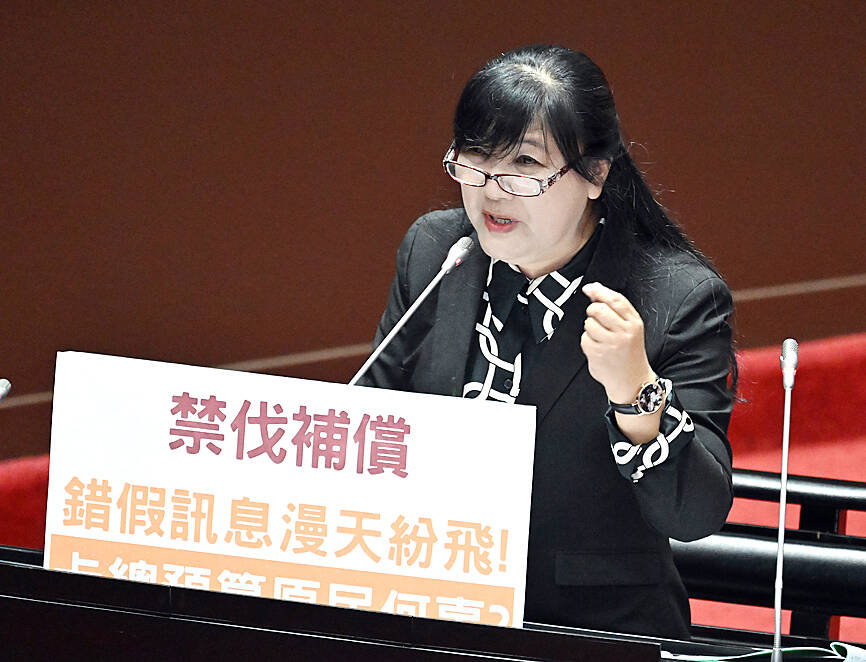A Democratic Progressive Party (DPP) legislator yesterday accused Chinese Nationalist Party (KMT) leaders and their allies of unfairly targeting two indigenous DPP lawmakers, drawing attention to questions regarding the recall of indigenous representatives.
DPP Legislator Saidhai Tahovecahe, representing the highland indigenous constituency, yesterday told reporters that she is being overwhelmed by the KMT party machine, which has called on its local councilors to recall two indigenous DPP lawmakers.
The KMT also joined forces with independent indigenous Legislator May Chin (高金素梅) to set up stations to gather signatures at service offices across the nation, she said.

Photo: Liao Chen-huei, Taipei Times
Tahovecahe, a Rukai from Kaohsiung’s Maolin District (茂林) and Asenay Daliyalrep (Chen Ying, 陳瑩), a Puyuma from Taitung County, are the only two elected indigenous DPP legislators.
The electoral system allows indigenous voters to elect six legislators, three for the “highland” and three for the “lowland” constituencies.
Tahovecahe and her aides said that due to the special nature of combined indigenous constituencies, the DPP has not launched any recall drive against the four other indigenous representatives.
On the other hand, KMT Chairman Eric Chu (朱立倫) and other party officials have named both of the DPP’s indigenous legislators as targets, calling it a “precision recall,” and have given instructions for party members and all indigenous councilors at the local level to pool resources toward that effort, Tahovecahe said.
Central Election Commission data released this week show that among the recalls the KMT submitted, Tahovecahe and Daliyalrep were among the 12 (out of 17) legislators who did not reach the required 1 percent threshold, due to errors and irregularities.
The CEC has given the KMT a 10-day grace period to submit additional signatures needed to reach the 1 percent figure.
Former CEC head Chen In-chin (陳英鈐) said the effort to oust indigenous legislators has been a subject of debate, and would require a constitutional interpretation, as the recall process contravenes the principle of “one person one vote, each ballot must be equal in value.”
When electing indigenous representatives, each person has one vote that they use to vote for one among a choice of representatives, meaning that people with relatively less support can still be elected, Chen said.
However, if there is more than one representative up for a vote in a recall, each voter must cast a ballot for or against each person, meaning they have more than one vote per person, Chen said.
“The CEC must solicit expert viewpoints and undertake studies to adjust the recall threshold in such cases of combined multiple electorates,” he added.
Tahovecahe also accused the KMT of directing the recall effort from the top, whereas recall campaigns against the KMT have been initiated on the local level without aid from DPP members.

The Coast Guard Administration (CGA) yesterday said it had deployed patrol vessels to expel a China Coast Guard ship and a Chinese fishing boat near Pratas Island (Dongsha Island, 東沙群島) in the South China Sea. The China Coast Guard vessel was 28 nautical miles (52km) northeast of Pratas at 6:15am on Thursday, approaching the island’s restricted waters, which extend 24 nautical miles from its shoreline, the CGA’s Dongsha-Nansha Branch said in a statement. The Tainan, a 2,000-tonne cutter, was deployed by the CGA to shadow the Chinese ship, which left the area at 2:39pm on Friday, the statement said. At 6:31pm on Friday,

The Chinese People’s Liberation Army Navy’s (PLAN) third aircraft carrier, the Fujian, would pose a steep challenge to Taiwan’s ability to defend itself against a full-scale invasion, a defense expert said yesterday. Institute of National Defense and Security Research analyst Chieh Chung (揭仲) made the comment hours after the PLAN confirmed the carrier recently passed through the Taiwan Strait to conduct “scientific research tests and training missions” in the South China Sea. China has two carriers in operation — the Liaoning and the Shandong — with the Fujian undergoing sea trials. Although the PLAN needs time to train the Fujian’s air wing and

Taiwanese celebrities Hank Chen (陳漢典) and Lulu Huang (黃路梓茵) announced yesterday that they are planning to marry. Huang announced and posted photos of their engagement to her social media pages yesterday morning, joking that the pair were not just doing marketing for a new show, but “really getting married.” “We’ve decided to spend all of our future happy and hilarious moments together,” she wrote. The announcement, which was later confirmed by the talent agency they share, appeared to come as a surprise even to those around them, with veteran TV host Jacky Wu (吳宗憲) saying he was “totally taken aback” by the news. Huang,

The American Institute in Taiwan (AIT) put Taiwan in danger, Ma Ying-jeou Foundation director Hsiao Hsu-tsen (蕭旭岑) said yesterday, hours after the de facto US embassy said that Beijing had misinterpreted World War II-era documents to isolate Taiwan. The AIT’s comments harmed the Republic of China’s (ROC) national interests and contradicted a part of the “six assurances” stipulating that the US would not change its official position on Taiwan’s sovereignty, Hsiao said. The “six assurances,” which were given by then-US president Ronald Reagan to Taiwan in 1982, say that Washington would not set a date for ending arm sales to Taiwan, consult